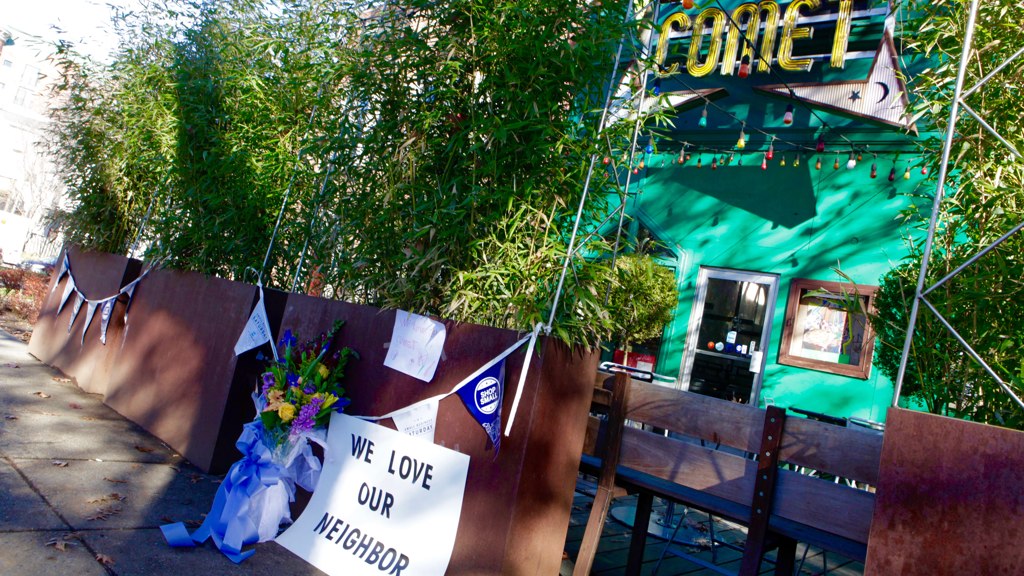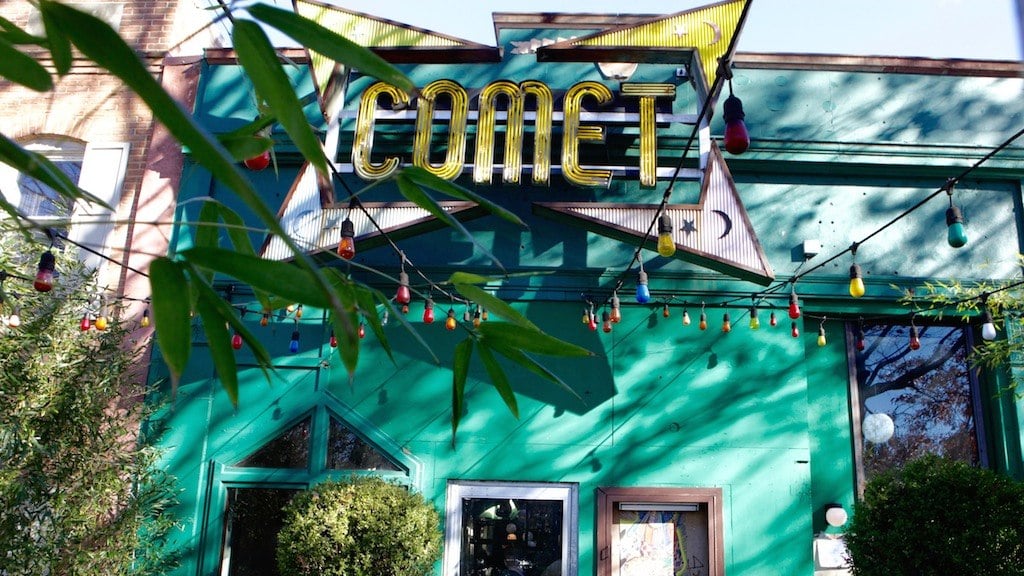Could Comet Ping Pong sue the trolls behind the “Pizzagate” movement?
After all, what the Northwest DC pizza shop and music venue has been subject certainly seems like to be a classic case of defamation: False and nonsensical accusations, with real-world consequences in terms that have included harassment against the owner and his employees, and culminated last Sunday when a gunman stalked through the restaurant and fired a few shots, later telling police he was there to “self-investigate” the conspiracy theory that has made Comet Ping Pong its target.
Any mainstream coverage of “Pizzagate” has easily and thoroughly been able to debunk the fiction that Comet Ping Pong is the nexus of a child-trafficking ring headed up by former Hillary Clinton campaign boss John Podesta. There are no Satanic rituals going on in the back room (where patrons play table tennis or enjoy music by local and touring punk bands), no secret tunnels to other stores on the family-heavy block of Connecticut Ave., Northwest, and no hidden basement. Still, the Pizzagate noise continues to proliferate thanks to a dedicated group of hardcore social-media users and fake-news sites that churn out bogus stories.
In the immediate wake of the Pizzagate conspiracy and the gunman it provoked, business at Comet Ping Pong has been flush thanks to throngs of longtime customers who want to show their appreciation of the place and its tasty pies. A one-day “Support Comet Ping Pong” event scheduled for Friday has been extended to last the entire weekend, and the restaurant has set up a GoFundMe page to help recover the costs of repairing the damage caused by gunman Edgar Maddison Welch and the paid security personnel Comet will now hire to ensure staff and customer safety.
At some point in the not-too-far-off future, though, the expressions of love will quiet down, but the online rumor-peddling may persist. And that could hit Comet Ping Pong and its owner, James Alefantis, not just with an manufactured image problems, but actual losses of business if people look up the restaurant and think twice about going after seeing pages of Google results that are more about an ugly shooting incident (or the phony controversy that incited it) than actual information about pizza, music, and ping-pong. The restaurant and its owner might be thinking about ways to beat back that potential impact, or at least be compensated for the distress they’ve already endured.
But where famous libel litigation often involves big, deep-pocketed media organizations, the new environment of viral fake news is different. Unlike a well-known defamation case like New York Times v. Sullivan—the 1964 Supreme Court case that established the standard that plaintiffs need to prove that publishers acted with actual malice in order to win—with a name-brand news source, Pizzagate’s perpetrators can’t be so easily identify. The conspiracy theory was born out of someone’s bizarre reading of Podesta’s emails that were published by Wikileaks, but spread virally on message boards like Reddit and 4chan and equally hard-to-trace Twitter accounts.
Alefantis, who declined to comment for this article, has not said publicly whether he intends to take legal action. But if he did, the first big questions would be who to sue, and how to break through their user names to find the actual people behind the Pizzagate campaign. One possible strategy would be a “John Doe” suit filed against users of a specific website, says Tom Clare, an Alexandria libel lawyer.

“Imagine Comet Ping Pong v. ‘John Doe,'” Clare says. “File the action, and you use that lawsuit to take some discovery and issue subpoenas to Reddit and try to identify specific speakers who you believe are at the root of this.”
Successfully poking around Reddit could lead to the reveal of users’ actual names—or at least IP addresses, which could then be traced to individuals—but it would certainly come with resistance from the company, Clare says. For one thing, Reddit could cite the 1996 Communications Decency Act, which has given immunity to online services that have hosted defamatory information posted by users. And Reddit would also be a deep-pocketed litigant—it’s owned by publishing giant Condé Nast.
But Clare, whose firm represented former University of Virginia Dean Nicole Eramo in her recent successful libel case against Rolling Stone, says that a court would likely side with Comet Ping Pong in getting social-media companies to turn over the relevant information.
“I think judges and juries are sympathetic to people who are in the situation of the little guy,” Eramo says. “Obviously these [Pizzagate] statements are demonstrably false. When I read the account of the gunman, it’s hard to imagine more damage than that kind of situation and all the publicity created out of it. I think a judge would be sympathetic to that and allow some discovery to be taken to find who the real wrongdoers are, the actual end users who are creating or trafficking in this narrative.”
Even if a “John Doe” action successfully turned up actual names of people who have been smearing Comet Ping Pong, it still might not get to the rumor’s originator. “Who started it—or trying to get back to ‘speaker zero,’ if you will—that’s the hardest things to find,” Clare says.
As difficult as it might be to pinpoint the Pizzagate speakers the fact that the fake news has had effects that need to be reported by legitimate media organizations makes Comet’s potential case all the more worth pursuing, according to Clare. Before Pizzagate, Comet Ping Pong was a neighborhood restaurant and a small, local music venue. Now it pops in headlines around the world.
“If this was just something circulating on a blog nobody read, I would say be careful about ringing the bell even louder,” Clare says. “But here, where pretty much everyone in the free world knows about this issue or has heard something about it, and it’s being reported about in major media outlets on a daily basis, and you’ve got gunmen coming in, you don’t have that concern. So a lot of constraint, the practical things that would normally keep people from wanting to proceed, are not present here.”
Unfortunately, successful litigation is unlikely to make all the negative attention disappear. The news that a gunman entered the restaurant will remain part of the historical record and, Clare concedes that, more disturbingly, a successful defamation lawsuit is unlikely to quiet all the trolls. Reddit shut down a page devoted to the Pizzagate conspiracy theory on November 22, but rather than end the chatter, users of that page have largely retreated to a r/The_Donald, a section populated by President-elect Donald Trump‘s most fanatical supporters, or decamped to Voat.com, a Reddit-like message board with even less moderation. As often as mainstream sources—and, as of last weekend, law enforcement—remind the public Pizzagate is totally bogus, it appears there’s a group of users dedicated to carrying out a permanent smear campaign against Comet Ping Pong.
“It’s like that old game we used to play as kids, Whack-a-Mole,” Clare says. “Anonymous speech has a lot of benefits in discourse and public debate, and the internet is a great place for that, but when you’re talking about people who are conspiracy theorists or who intend to do harm, that anonymity creates a real obstacle to justice in the broader sense. What I would tell Comet is that you’re never going to convince the true believers. You’re never going to shut this down entirely.”
Even if Comet Ping Pong sues and wins, the best disinfectant for the stench inflicted on it is time.
“Unfortunately, in today’s world, your reputation is only as good as the Google results that come up when someone searches you,” Clare says. “Now because of this shooting, I think that Google is going to return this as a hit for a long time and I think it will have an impact. If I didn’t know anything about this, it would certainly impact my thinking if I ran a Google search, at least in the short term. Five years from now, maybe not, but in five years it may be too late.”


















